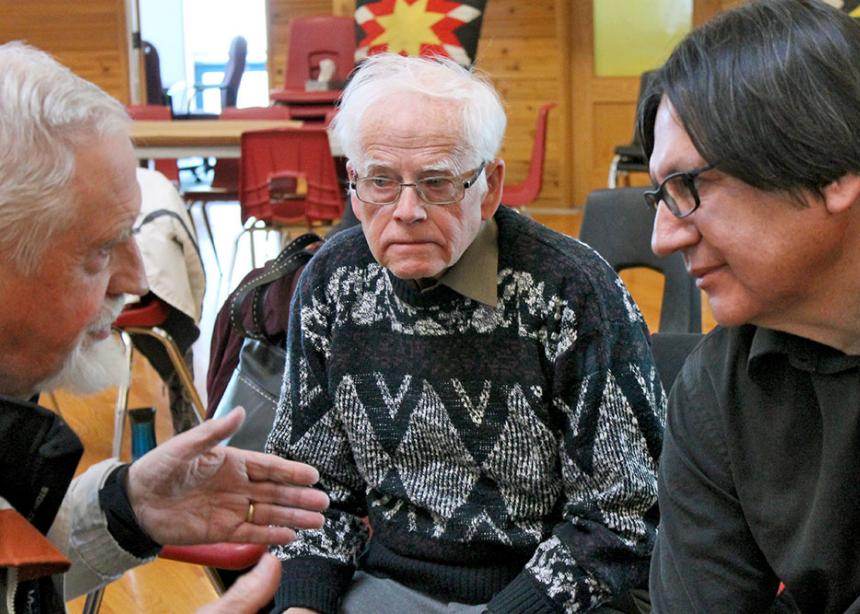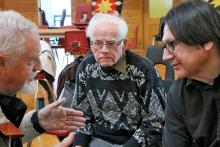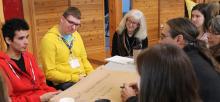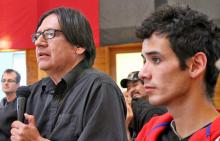Instead of the usual small, intimate gathering that has characterized previous fall Partnership Circle meetings, more than 85 northern indigenous people, Mennonite Church Manitoba representatives, people from other denominations and social service agencies gathered on Nov. 1 to form a vastly expanded circle at Winnipeg’s Circle of Life Thunderbird House.
For more than 10 years the MC Manitoba partnerships with northern indigenous communities have struggled to overcome financial, geographic and cultural barriers to build mutual, reciprocal and meaningful relationships.
Although time was given for the partners to meet in their own circles to review the past year and plan for the future, this fall’s agenda was much broader.
Norm Voth, director of evangelism and service ministries for MC Manitoba, explained, “Questions were being asked about why there is nothing in Winnipeg, given the significant urban issues that exist. In the past, we have reflected on what we were doing, but we wanted to broaden opportunities for other partnerships, consider broader issues and ask whether what we are doing is helpful.”
“We intentionally broadened the invitation beyond the Mennonite community,” added Steve Heinrichs, director of indigenous relations for MC Canada.
Adrian Jacobs, keeper of the circle at Sandy-Saulteaux Spiritual Centre near Beausejour, Man., and an indigenous advocate and educator, said that when Jesus called his disciples “to make disciples of all nations,” he never indicated they should take away a people group’s nationhood. “There are four things that define a nation,” he said. “Language, culture, governance and land. The church was involved in taking away our language. It should be involved in some way of restoring it.”
In speaking about land, he told a story about “the racist reaction and huge rejection to our community locating in the southeast part of Winnipeg, resulting in our present location near Beausejour. We have just as much right as anybody else to be there. If you don’t have the willingness to stand up and say something about such injustices and the racism that exists, you cannot be in relationship. You must enter into the struggle and enter the pain we feel and not sit back in a comfortable place, insulated from all the stuff going on, because a real relationship is more than an isolated concern.”
Michael Champagne, an activist, community organizer and founder of Aboriginal Youth Opportunities (AYO) in Winnipeg’s North End, shared a similar message. “Programs don’t change people,” he said. “Relationships change people.”
Since graduating from high school in 2005, he has been using his passion and energy to create a better, safer world for indigenous youth. He founded AYO in 2010 and a year later he helped the “Meet me at the bell tower” movement, a weekly event that aims to make the North End, known for its poverty, crime and violence, a safer community. Every Friday evening, people of all ages gather at the bell tower at the corner of Selkirk Avenue and Powers Street to discuss neighbourhood issues and figure out ways to combat crime in the area.
“We don’t need a white horse galloping in to save the day,” said Champagne. “We need space for indigenous wisdom and indigenous school of thought. We need support and space for our own identity to be developed. Will you, the settler community, be brave enough to create space for this?” he challenged. “The time is now.”
Norman Meade, pastor of Manigotagan Fellowship, served as elder over the proceedings. “We, as churches, really have to be more inviting,” he said. “Let’s open our churches and learn from them, from the young people.”
--Posted Nov. 19, 2014






Add new comment
Canadian Mennonite invites comments and encourages constructive discussion about our content. Actual full names (first and last) are required. Comments are moderated and may be edited. They will not appear online until approved and will be posted during business hours. Some comments may be reproduced in print.